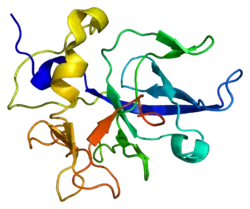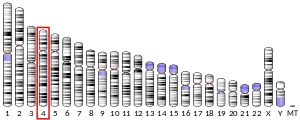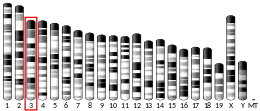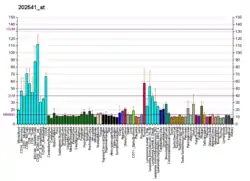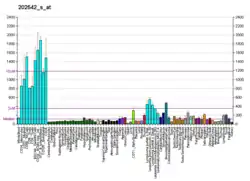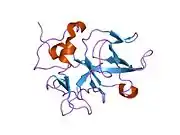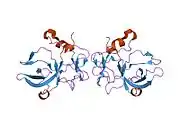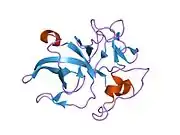SCYE1
Aminoacyl tRNA synthetase complex-interacting multifunctional protein 1 is a protein that in humans is encoded by the AIMP1 gene.[5][6][7]
The protein encoded by this gene is a cytokine that may be induced by apoptosis and is also released from professional antigen-presenting cells such as dendritic cells. The release of this cytokine renders the tumor-associated vasculature sensitive to tumor necrosis factor. The precursor of SCYE1 (pro-SCYE1) is identical to the p43 subunit, which is associated with the multiaminoacyl-tRNA synthetase complex (mARS). Pro-SCYE1 may function in binding RNA as part of the tRNA synthetase complex in normal cells and in stimulating inflammatory responses after proteolytic cleavage in tumor cells.[7] As an inflammatory cytokine, AIMp1/p43 has demonstrated the ability to skew T-helper polarization in the direction of Th-1, and its homozygous deletion leads to a hyper-polarized Th-2 phenotype.
References
- GRCh38: Ensembl release 89: ENSG00000164022 - Ensembl, May 2017
- GRCm38: Ensembl release 89: ENSMUSG00000028029 - Ensembl, May 2017
- "Human PubMed Reference:". National Center for Biotechnology Information, U.S. National Library of Medicine.
- "Mouse PubMed Reference:". National Center for Biotechnology Information, U.S. National Library of Medicine.
- Kao J, Houck K, Fan Y, Haehnel I, Libutti SK, Kayton ML, Grikscheit T, Chabot J, Nowygrod R, Greenberg S, et al. (Nov 1994). "Characterization of a novel tumor-derived cytokine. Endothelial-monocyte activating polypeptide II". J Biol Chem. 269 (40): 25106–19. PMID 7929199.
- Kao J, Fan YG, Haehnel I, Brett J, Greenberg S, Clauss M, Kayton M, Houck K, Kisiel W, Seljelid R, et al. (May 1994). "A peptide derived from the amino terminus of endothelial-monocyte-activating polypeptide II modulates mononuclear and polymorphonuclear leukocyte functions, defines an apparently novel cellular interaction site, and induces an acute inflammatory response". J Biol Chem. 269 (13): 9774–82. PMID 7545917.
- "Entrez Gene: SCYE1 small inducible cytokine subfamily E, member 1 (endothelial monocyte-activating)".
- Lee, Yeon Sook; Han Jung Min; Son Sung Hwa; Choi Jin Woo; Jeon Eun Ju; Bae Suk-Chul; Park Young In; Kim Sunghoon (Jul 2008). "AIMP1/p43 downregulates TGF-beta signaling via stabilization of smurf2". Biochem. Biophys. Res. Commun. United States. 371 (3): 395–400. doi:10.1016/j.bbrc.2008.04.099. PMID 18448069.
Further reading
- Kao J, Ryan J, Brett G, et al. (1992). "Endothelial monocyte-activating polypeptide II. A novel tumor-derived polypeptide that activates host-response mechanisms". J. Biol. Chem. 267 (28): 20239–47. PMID 1400342.
- Quevillon S; Agou F; Robinson JC; Mirande M (1998). "The p43 component of the mammalian multi-synthetase complex is likely to be the precursor of the endothelial monocyte-activating polypeptide II cytokine". J. Biol. Chem. 272 (51): 32573–9. doi:10.1074/jbc.272.51.32573. PMID 9405472. S2CID 34057814.
- Quevillon S, Robinson JC, Berthonneau E, et al. (1999). "Macromolecular assemblage of aminoacyl-tRNA synthetases: identification of protein-protein interactions and characterization of a core protein". J. Mol. Biol. 285 (1): 183–95. doi:10.1006/jmbi.1998.2316. PMID 9878398.
- Park SG, Jung KH, Lee JS, et al. (1999). "Precursor of pro-apoptotic cytokine modulates aminoacylation activity of tRNA synthetase". J. Biol. Chem. 274 (24): 16673–6. doi:10.1074/jbc.274.24.16673. PMID 10358004. S2CID 25940947.
- Kim Y, Shin J, Li R, et al. (2000). "A novel anti-tumor cytokine contains an RNA binding motif present in aminoacyl-tRNA synthetases". J. Biol. Chem. 275 (35): 27062–8. doi:10.1074/jbc.C000216200. PMID 10852899.
- Renault L, Kerjan P, Pasqualato S, et al. (2001). "Structure of the EMAPII domain of human aminoacyl-tRNA synthetase complex reveals evolutionary dimer mimicry". EMBO J. 20 (3): 570–8. doi:10.1093/emboj/20.3.570. PMC 133484. PMID 11157763.
- Shalak V, Kaminska M, Mitnacht-Kraus R, et al. (2001). "The EMAPII cytokine is released from the mammalian multisynthetase complex after cleavage of its p43/proEMAPII component". J. Biol. Chem. 276 (26): 23769–76. doi:10.1074/jbc.M100489200. PMID 11306575. S2CID 20768076.
- Chang SY; Park SG; Kim S; Kang CY (2002). "Interaction of the C-terminal domain of p43 and the alpha subunit of ATP synthase. Its functional implication in endothelial cell proliferation". J. Biol. Chem. 277 (10): 8388–94. doi:10.1074/jbc.M108792200. PMID 11741979.
- Battersby S; Boddy SC; Critchley HO; Jabbour HN (2002). "Expression and localization of endothelial monocyte-activating polypeptide II in the human endometrium across the menstrual cycle: regulation of expression by prostaglandin E(2)". J. Clin. Endocrinol. Metab. 87 (8): 3928–35. doi:10.1210/jc.87.8.3928. PMID 12161535.
- Strausberg RL, Feingold EA, Grouse LH, et al. (2003). "Generation and initial analysis of more than 15,000 full-length human and mouse cDNA sequences". Proc. Natl. Acad. Sci. U.S.A. 99 (26): 16899–903. Bibcode:2002PNAS...9916899M. doi:10.1073/pnas.242603899. PMC 139241. PMID 12477932.
- Park H, Park SG, Kim J, et al. (2003). "Signaling pathways for TNF production induced by human aminoacyl-tRNA synthetase-associating factor, p43". Cytokine. 20 (4): 148–53. doi:10.1006/cyto.2002.1992. PMID 12543078.
- Ahn HC; Kim S; Lee BJ (2003). "Solution structure and p43 binding of the p38 leucine zipper motif: coiled-coil interactions mediate the association between p38 and p43". FEBS Lett. 542 (1–3): 119–24. doi:10.1016/S0014-5793(03)00362-4. PMID 12729910. S2CID 39222196.
- Kim MJ, Park BJ, Kang YS, et al. (2003). "Downregulation of FUSE-binding protein and c-myc by tRNA synthetase cofactor p38 is required for lung cell differentiation". Nat. Genet. 34 (3): 330–6. doi:10.1038/ng1182. PMID 12819782. S2CID 41006480.
- Wolfe CL, Warrington JA, Davis S, et al. (2004). "Isolation and characterization of human nuclear and cytosolic multisynthetase complexes and the intracellular distribution of p43/EMAPII". Protein Sci. 12 (10): 2282–90. doi:10.1110/ps.03147903. PMC 2366922. PMID 14500886.
- Mueller CA, Schluesener HJ, Conrad S, et al. (2004). "Spinal cord injury induces lesional expression of the proinflammatory and antiangiogenic cytokine EMAP II". J. Neurotrauma. 20 (10): 1007–15. doi:10.1089/089771503770195858. PMID 14588117.
- Murray JC, Symonds P, Ward W, et al. (2004). "Colorectal cancer cells induce lymphocyte apoptosis by an endothelial monocyte-activating polypeptide-II-dependent mechanism". J. Immunol. 172 (1): 274–81. doi:10.4049/jimmunol.172.1.274. PMID 14688335. S2CID 7939914.
- Ota T, Suzuki Y, Nishikawa T, et al. (2004). "Complete sequencing and characterization of 21,243 full-length human cDNAs". Nat. Genet. 36 (1): 40–5. doi:10.1038/ng1285. PMID 14702039. S2CID 21903526.
- Murray JC, Heng YM, Symonds P, et al. (2004). "Endothelial monocyte-activating polypeptide-II (EMAP-II): a novel inducer of lymphocyte apoptosis". J. Leukoc. Biol. 75 (5): 772–6. doi:10.1189/jlb.1003487. PMID 14982944. S2CID 31089927.
